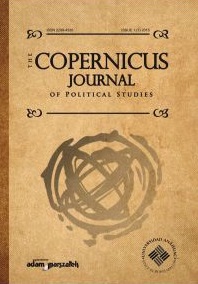Turkey’s “New” Middle East or More of the Same
DOI:
https://doi.org/10.12775/18310Keywords
Turkey, Middle East, regional actor, role model, AKP’s foreign policy, the USAAbstract
Turkey’s Middle East policy has been changed a lot in time but the most dramatic one has happened during the reign of the AKP government. As the political Islam tendency in Turkey has evolved, the economic, political and cultural relations with the Middle East have developed in parallel. Besides, the Turkish democracy, which seems to solve its problems with Islam, is shown by some people as a “model” for the Middle Eastern countries. It is a fact that the recent Gezi protests in Turkey constitute some doubts about the success of this model but the impact of AKP’s new foreign policy on the Middle Eastern politics is clear. With the “zero problems policy” and the “new activism” era in Turkish foreign policy, Turkey has focused on the Middle East more than ever. However, to evaluate this change as a complete turn from Turkey’s centuryold westernization and a shift in its identity would be a misreading of the developments. In fact, this change could be interpreted as another phase in its strategic foreign policy enriched with an opening to the East. In this context, this article tries to discuss the new orientation of Turkey upon old grounds in the Middle East according to its new focus between the regional dynamics and global actors.
Full text: http://bazhum.muzhp.pl/czasopismo/589/?idno=14763
References
Akgün M. et al., The Perception of Turkey in the Middle East, Istanbul 2009.
Altunışık M., The Middle East in Turkey-USA Relations: Managing the Alliance, “Journal of Balkan and Near Eastern Studies” 2013, No. 2.
Barnett M., Dialogues in Arab Politics: Negotiations in Regional Order, New York 1998.
Belge M., Türkiyede Zenofobi ve Milliyetçilik [in:] Modern Türkiye’de Siyasi Düşünce: Milliyetçilik, T. Bora (ed.), Istanbul 2003
Brown C., International Politics and the Middle East: Old Rules, Dangerous Game, Princeton 1984.
Dağı I., Transformation of Islamic Political Identity in Turkey: Rethinking the West and Westernization, “Turkish Studies” 2005, No. 6
Dal E., The Transformation of Turkey‘s Relations with the Middle East: Illusion or Awakening?, “Turkish Studies” 2012, No. 2,
Davutoğlu A., Principles of Turkish Foreign Policy and Regional Political Structuring, Ankara 2012.
Ehteshami A., Elik S., Turkey’s Growing Relations with Iran and Arab Middle East, “Turkish Studies” 2011, No. 4
Hourani A., How Should We Write the History of the Middle East?, “International Journal of Middle East Studies” 1991, No. 2.
Kardaş Ş., Turkey: Redrawing the Middle East Map or Building Sandcastles, “Middle East Policy” 2010, No. 1.
Kirişçi K., Turkey’s ‘Demonstrative Effect’ and the Transformation of the Middle East, “Insight Turkey” 2011, No. 2.
Martin L., Turkey and the USA in a Bipolarizing Middle East, “Journal of Balkan and Near East Studies” 2013, No. 2
Stevens A., The ‘Turkish Model’ in the Arab Spring: Discourse and Foreign Policy Metaphors, “The Journal of Turkish Weekly” July 2, 2012.
Walt S., The Origins of Alliances, New York 1987.
Yinanç B., PM Poses as a Middle Eastern Rather than a European Leader, “Hürriyet Daily News” June 13, 2011.
Published
How to Cite
Issue
Section
Stats
Number of views and downloads: 0
Number of citations: 0



